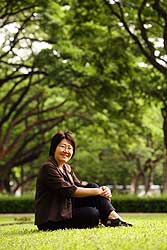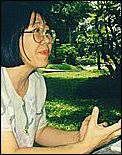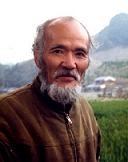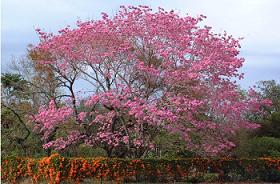WALKING THE PATH
June 28, 2008
BANGKOK, Thailand – After three hours in traffic and a tough phone interview on the current political mayhem – both in parliament and on the streets – Rosana Tositrakul managed to look poised and laid-back as she entered the room to join a round table discussion. Her topic: Life as an engaged Buddhist in social movements.
 << Photos by YINGYONG UN-ANONGRAK
<< Photos by YINGYONG UN-ANONGRAK
The forum was part of the monthly discussion forum with the New Consciousness group, or Jitwiwat, an initiative by respected scholar Prof Prawase Wasi.
As soon as she arrived, a young author, Vichak Panich, approached her and presented her with his new book on self-transformative learning. “For a female warrior,” he wrote in the dedication.
The bespectacled Rosana was bemused. “I kinda like the idea. That is what I picture myself when I am about to fight for something, to go forward and achieve the goals,” said Rosana Tositrakul, 55, a veteran social activist and the newly-elected Bangkok senator. “The goal is not about a higher position or wealth. It is about fighting for what is right and just. Such a fighting spirit keeps me alive,” she said, eyes sparkling.
Taking up the warrior idea in her talk, Rosana said she was inspired by the vision of the warrior in Tibetan meditation master Chogyam Trungpa’s Shambhala: The Sacred Path of the Warrior, a book that details the vision of individuals establishing an enlightened society, as well as the message of Miguel de Cervantes in Don Quixote, about the mad knight who fights injustice.
That is what has driven her to enter national politics, despite caution from all sides that politics are “dirty”. But her conviction to right wrongs struck a chord with Bangkok voters. They gave her a stamp of approval with 740,000 votes.
A social activist from her school days, Rosana’s low-profile work with engaged Buddhism and the non-violence movements changed after the economic collapse in 1997, when she led some 30 civic groups to expose corruption at the Ministry of Public Health. And for the first time in Thai history, a politician who was minister at the time was jailed for corruption.
Rosana became a household name when she worked with other consumer rights groups to campaign against the privatisation of the Electricity Generating Authority of Thailand and PTT PCL, the country’s gas and oil giant.
“I have no ambition in politics or aspiration to be a heroin,” said the outspoken peace activist. “What I have done is a part of my Buddhist practice – socially engaged Buddhism.”
For her, practising Buddhism is not only about talking philosophy or sofa meditation; it is acts of compassion, courage and understanding to help alleviate suffering.

“Engaged Buddhism is about getting your hands and feet in the mud, putting your practice into action”
“Engaged Buddhism is about getting your hands and feet in the mud, putting your practice into action,” she said. “Whatever comes in life, I’ll take them as lessons to help me practise the path.”
This means keeping her mind calm, unshaken and compassionate, despite being criticised as a “backward” and “left-wing” thinker who would drag the country down the economic road to ruin, and despite having been taken to court in several lawsuits by high-ranking officials and politicians in power. Getting death threats or having a bomb explode near her office are also part of the deal.
People like to label each other, she said. “If you are not on the right, then you must be on the left. If you are not with us, then you are with them. Buddhism tells us not to be on the extremes, which is not easy. I have to remind myself constantly not to stray and get lost in all this.”
Whenever she has doubts about whether she is on the right path, she thinks of advice from a meditation master she highly respects, Luang Por Khamkhian Suwanno. “Luang Por Khamkhian once taught me that whenever our mind strays out of normality or equanimity, it is wrong. No matter how good the reasons we may give to ourselves to justify our emotions and causes of actions, it is still wrong. Being angry or revengeful is never right.
“Having said all that, I must point out that I am still in the process of learning and trying.”
Sources of inspiration
A student of journalism and mass communications at Thammasat University during the 1970’s blossoming of democracy, Rosana’s inspiration for change has been shaped by contemporary Buddhist thinkers such as Buddhadasa Bhikkhu, Vietnamese Zen monk Thich Nhat Hanh and Japanese pioneer of natural farming, Masanobu Fukuoka, as well as non-violence guru Mahatma Gandhi. They remain her source of inspiration, she pointed out.
An avid reader, Rosana has created her own ritual to embody the ideas in the books she reads by setting out to translate a book per year. This is done during the three-month-long retreat from work during Buddhist Lent, which is also when she works on meditation in a forest temple.
While she translated several titles by Thich Nhat Hanh, she adopted the Zen master’s ideas on the community of Sangha into her life and work. To live his concept, Rosana and some 14 friends, dubbed “The Order of Inter-being”, convened once every two weeks to recite 14 mindfulness trainings, guidelines for mindful living and to work towards peace and social service.
Rosana said she has learned many valuable lessons from Thich Nhat Hanh, whom she called Tha y (teacher), both from his books and from being in his company during his short stay in Thailand some 30 years ago.
“Despite being a monk and teacher, Tha y didn’t try to impose his views and practices on me. He was just himself and that inspired me to follow his practices and teachings,” she said.
One of the principles she holds steadfastly to is, “Having different convictions is not a problem. It becomes a problem when we try to force others to adopt our views,” said Rosana.
Buddhism encourages compassionate dialogue and discussion, she said. “But the Buddha’s way may take time, which today’s remote-control generation does not have. We are used to getting things fast and instantly. And we bring this attitude into our way of solving problems.”
In the Buddhist view, to work with injustice or social ills demands great compassion as well as the understanding of the interconnectedness of things, Rosana pointed out. She said she learned about this while she was working as a farmhand in 1989.
After translating an all-time classic, One-Straw Revolution, by Masanobu Fukuoka, a master of natural farming, Rosana applied for an exchange programme to work on farms in Japan. Her sole purpose was to visit the visionary philosopher-cum-farmer Fukuoka.
 “After working on farms for nine months, and after two days of hopping on and off 30 trains, I arrived at last to Uncle Fukuoka’s farm,” she recalled with a smile. “Once, while we were travelling on a train together to other towns, Uncle Fu told me, ‘Rosana, we should not be worrying if we would get to our destination. What we should focus on is whether or not we are on the right train. If we’re on the right train, then we can be sure that we would get to the right destination, sooner or later.”‘
“After working on farms for nine months, and after two days of hopping on and off 30 trains, I arrived at last to Uncle Fukuoka’s farm,” she recalled with a smile. “Once, while we were travelling on a train together to other towns, Uncle Fu told me, ‘Rosana, we should not be worrying if we would get to our destination. What we should focus on is whether or not we are on the right train. If we’re on the right train, then we can be sure that we would get to the right destination, sooner or later.”‘
She spent a few months with Fukuoka and learned the philosophy of natural and “non-doing” farming and also the art of living.
“It’s all about keeping balance. The weeds would not grow if you improve the quality of soil. Mostly, the bad weeds grow in damaged soil. It’s part of natural protection before the soil turns into dessert. So we don’t have to fight the bad system directly, what we can do is to nourish a good environment for good things to grow,” Rosana said.
That also applies to politics, she believes. For Rosana, the soil of parliamentary politics can be nourished back to health through people’s politics and empowerment. That is why she has high respect for Gandhi, regarding him as her role model.
“Gandhi inspired me greatly. He experimented with his ideas in his own life. He wanted to bring truth into politics. He was a visionary man who foresaw that in order to fight for India’s independence from England, it was important that people were self-reliant,” she said.
It was Gandhi’s vision of self-reliance that motivated her to start the Herbs for Self-Reliance Project, which later triggered widespread public interest in herbal and traditional medicines. The project later grew into the Thai Holistic Health Foundation to highlight the importance of holistic health and the wealth of local knowledge in this field.
One of Rosana’s battlefronts is consumerism, which makes people believe their happiness relies on material possessions. A baby massage volunteer programme is one of her little projects to make people see the lies in this belief.
“I want people to see that happiness is in our hands. It’s simple. Go and massage some children and you will know the bliss of joy. Our happiness does not come from our consumption, but from our giving to others,” she said.
Apart from her child massage programme, Rosana has also adopted the craft of laying golden leaf on small Buddha statues as her hobby. “It’s a meditative hobby and makes valuable gifts. It also cheers me up.
“Working towards social causes and fighting against injustice takes time. Success does not come easily or quickly. And at times, it can dampen your heart. So I need something to boost my spirit, something I can achieve within a fixed period of time.
“It helps me to go on with difficult, lengthy tasks.”
Human fate and tabebuia
Indeed, Rosana’s path has not been rosy. She was disheartened many times. Her Herbs for Self-reliance Project, for example, experienced a setback with an introduction of the 30-baht health care scheme. “People suddenly returned to depend on medical treatment rather than self-care prevention,” she explained.
Would her 30-year effort be in vain? Would the message of self-reliance be lost? “Sometimes it seems meaningless to struggle to get things right over and over again. It is unending work.”
The absurdity of life reminded her of Sisyphus’s fate in Greek mythology, specifically in the interpretation of the Algerian-born, French writer Albert Camus.
“Our human fate is like that of Sisyphus, who was condemned to repeat forever the same meaningless task of pushing a rock up a mountain, only to see it roll down again. It looks pointless and meaningless.”
Yet, she continued, Camus pointed that one day while Sisyphus was pushing the rock up a mountain, he saw a little flower blooming along the way, and he felt happy.
“That’s perhaps the reason why after all the pointless, tiresome tasks, we should continue what we are doing, as there is beauty along the way.”
Camus’s message strikes a chord with her. Rosana identified quickly with this novelist as she, too, finds her solace in flowers – the tabebuia, or pink trumpets, the Thai version of Sakura.
“Each year, when the season is coming, I feel excited, like an old friend is coming for a visit.”
Once a year, from February to March, Rosana drives to areas with tabebuia in bloom.
“The tree is just magnificent. It stands alone, spreading its branches so elegantly. And the pink flowers are just breathtakingly beautiful. Despite the unfriendly environment, the tabebuia remains honest to the season. It grows and blooms courageously.

“The undeniable truth expresses itself in such an ordinary way. When we give ourselves time to contemplate on the manifestation of these natural truths, we are empowered and feel energised,” said Rosana.
When the season’s gone, Rosana has pictures of tabebuia to look at and to remind her that she must continue her uphill tasks, like Sisyphus.
“It’s our duty to do the right thing, to persevere and persevere, to create positive karma, and the rest will be taken care of,” she said.
“My spiritual teacher once told me that a Buddhist should grab any opportunity to do the right thing and to get things right, albeit small deeds. It doesn’t matter if you succeed or fail. After all, Buddhism is the path and the goal in itself.”
By KARNJARIYA SUKRUNG
Source : The Bangkok Post




